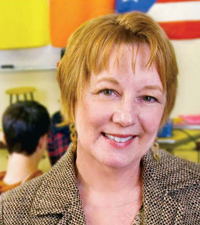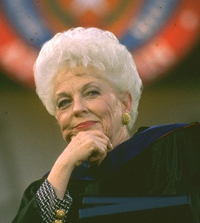UTeach bolsters nation’s schools one at a time
Picture a new high-school teacher on her first day, fresh out of college, with an idealized image of what’s in store for her: deferential students, coherent lesson plans, a supportive administration. One or two months later, too often, that optimism has been replaced by dismay, frustration and exhaustion. Mary Diehl, master teacher in the uteach-liberal arts program, knows it doesn’t have to be that way.

While the demands of the classroom have changed dramatically during the past 70 years, the model for secondary teacher training has not: provide students with plenty of theory, but only a single semester of student teaching experience at the end of their college career.
With little real-world preparation, new teachers are left to wrestle with becoming proficient in their course content and figuring out how theory plays out in a roomful of hormonally imbalanced adolescents. This can be an overwhelming challenge that leads many young people to abandon the profession—resulting in a nationwide teacher shortage as demand for teachers continues to rise.
Almost a quarter of new teachers leave the field within three years, according to a May 2008 national Bureau of economic research study. and, replacing public school teachers costs the country $2.2 billion annually, the alliance for excellent education conservatively estimates.
Seeking to stanch this exodus, the University of Texas at Austin devised UTeach, the first program of its kind to revamp the country’s teacher training model.
Launched in the College of Natural Sciences and replicated in both liberal arts and engineering, UTeach is gaining converts at universities across the country. Senior associate Dean Richard Flores oversees the liberal arts program, where enrollment has grown from seven to more than 300.
While the UTeach model includes a collaboration with the College of Education, the program bases students within the disciplines they will teach. UTeach places students in classrooms sooner and more often than traditional programs and pairs them with mentors and master teachers for reality-based instruction.
Graduates have a solid grounding in course content, four semesters of varied classroom experiences—from elementary to high school—and the much-needed support of a network of mentors and colleagues.
Diehl, associate director of UTeach-Liberal Arts, says the program’s goal was to reduce the attrition rate of new teachers, but it’s clear the benefits reach far beyond that. The sooner students enter the classroom, she says, the more likely they are to discover whether teaching is for them. “They enter the profession more confident and dedicated to their jobs, which means their students have better experiences and learn more.”
While Liberal Arts has not yet conducted an official survey of its alumni since UTeach graduated its first class in 2003, anecdotal evidence bears out Diehl’s premise.
“Sometimes I forget I’m a first-year teacher,” says Sara Kanewske, a world geography teacher at Connally High School in the Pflugerville Independent School District. “I meet first-year teachers who struggle with classroom management, or who worry too much about the students liking them rather than earning their respect and teaching them.”
Kanewske says the extra semester UTeach added during college was well worth the advantages she enjoys on the job. Anthony Poullard, another recent graduate, faced a tough situation even for the most experienced of educators. Hired to replace a teacher on maternity leave who later decided to stay home with her baby, Poullard took over a class of 7th and 8th grade Spanish students after they had a series of substitutes.
“I was prepared to enter that classroom,” he says. “Ninety percent of it was believing in myself. I learned through my experiences in UTeach-Liberal Arts that if you enter a classroom as a timid, soft-spoken person, the students will eat you alive.”
Poullard set high expectations and established a structured learning environment the first day he walked into the class. “My first week was a good week, and i attribute my success to the program,” he says.
Kanewske and Poullard are just two of more than 300 UTeach-Liberal Arts alumni making their way into Texas (usually) schools and making a difference, classroom by classroom.
“Alumni say they are more confident, have better classroom management, are ready to deal with diverse populations, and have great subject-specific training, especially when compared to teachers who haven’t had the benefit of UTeach,” Diehl says. Certainly, the effects of better-trained teachers will take years to realize, but the immediate payoff of UTeach is happier and self-assured new teachers—the basic building blocks for educational reform and success.
Poullard agrees, “The program helped solidify my decision to become a teacher, and with all of the practice we receive, it makes the profession much more enjoyable.”
Preparing the Women of Tomorrow

As governor, Ann Richards championed civil rights for women and minorities, calling for a “New Texas” to increase opportunities for under-represented communities throughout the state.
In 2007, when the Ann Richards School for Young Women Leaders opened, more than half of the entering students were Hispanic and about 13 percent were African American.
The university’s Center for Women’s and Gender Studies has partnered with the school to provide curriculum and program support. In addition, researchers are examining such issues as the effects of a single-sex educational environment, leadership and civic participation, and science, technology, engineering and math concepts.
University students also are gaining research and educational experiences through internship programs at the school for sixth- through 12th-graders.
“Our work with the school deepens our understanding of the challenges that girls and women face as they strive to succeed,” Gretchen Ritter, director of the center, says. “The partnership supports the school’s mission to provide young women with the skills and self-confidence they need to complete school, attend college, and become leaders in their chosen fields.”
